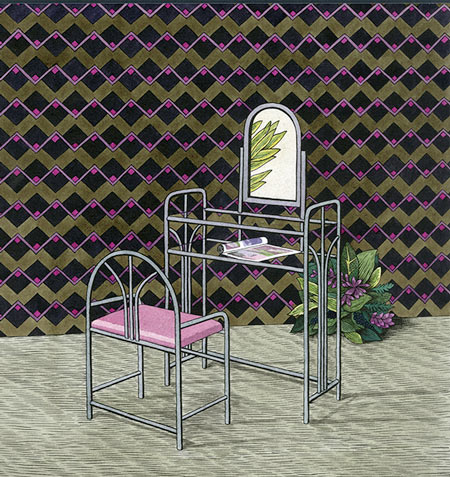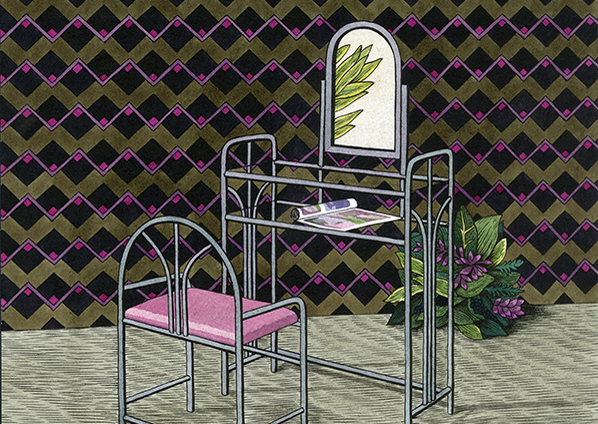
In the name of God the Merciful:
Pray on the Prophet—Peace be upon him.
Majana ela kheer lfana o lfakm o shar taadana o taadakm: May nothing affect us but goodness for us and you, and may evil stay away from us and you.
T
here was once a man who had a sister and they lived happily alone in their house. He fished and traded and raised sheep, and then returned home to his sister. They enjoyed each other’s company and were happy.
By Allah’s will, the brother came of age. His sister said to him, “O brother, why don’t you get married?”
“I’m afraid to bring home someone who will make you uncomfortable and anxious,” he replied.
“No, my brother,” she assured him. “Our neighbors have a daughter and she is pretty. Insha’Allah she will be a sister to me.”
The wife called to her husband, saying, “Did you hear? Did you hear how your sister is not a decent girl?”
The man went and proposed to the neighbor’s daughter. By God’s will, they were married and he brought her back home.
In the beginning, the wife got along well with the sister. She loved her and looked after her and they had fun together. But the wife was very jealous and one day a bad intention infiltrated the wife’s heart toward the sister.
Whenever the brother was away on travel or elsewhere, the sister sat at her window in her room and talked to the moon. She said to it, Greetings, father of happiness! O one who gives good company to virtuous girls in their mother’s house.
The sister did this to pass the time, for they had no electricity—nothing except the moon.
On one of these occasions, the brother’s wife overheard the sister talking to the moon. She put her ear against the door to listen as the poor girl talked to the moon:
Greetings, father of happiness!
O one who gives good company to virtuous girls in their mother’s house.
One day, the brother came back from his trading trip and his wife said to him: “Hey, dearest?”
“Yes?” he replied.
“I have something to tell you about your sister. She’s not decent!”
“My sister? What!” he exclaimed. “How is my sister indecent? I raised her very well. And she comes from a good family,” said the brother.
“No,” said his wife. “At night, your sister has company in her room. She sits and chats with him. If you want to hear for yourself, I’ll show you tonight.”
The moon appeared that night, and the sister came in and sat with her brother and his wife. They dined, chatted, and had a good time. Then she withdrew to her room to talk to the moon as usual:
Greetings, father of happiness!
O one who gives good company to virtuous girls in their mother’s house.
The wife called to her husband, saying, “Did you hear? Did you hear how your sister is not a decent girl? But me, I would never do anything wrong.”
But the brother didn’t listen because he believed his sister was a very good girl.
One day, a man came around selling eggs. He advertised them, “Baid al hamara, baid al hamara, baid al hamara!”
The brother’s wife went and bought all the eggs the man had, took them home, cooked them, and gave them to the girl, saying, “Eat! Eat all the eggs!”
The poor girl ate all the eggs, and then her stomach began to bloat, getting bigger and bigger.
Then the wife said to the brother, “See, look at your sister! She’s pregnant! Go now, take her away and kill her and that’s it!”
The brother had no choice. He went to his sister and said to her, “Come, let’s go to the barr,” an oasis in the open desert and a favored spot for picnics.
So they went to the desert and sat under a tree. The sister put her head on her brother’s lap and said to him, “Don’t leave me!”
“No, don’t worry,” he answered. “We will sit here and have a lovely time and drink some coffee, and then we will head back to town.”
So the sister fell asleep. As she continued to sleep, her brother slowly slipped his legs out from under her. He left her there, alone, and went back home.
The wife was happy with her victory. Now there was no one to compete with her for the brother!
His wife asked him, “What did you do with her?”
“It’s over. I killed her,” he replied.
The wife was happy with her victory. Now there was no one to compete with her for the brother! By Allah’s will, the wife stayed with her husband.
Far away in the desert, the sister woke up and called out, “Brother! O Brother! Brother!” But she didn’t find him anywhere.
The poor girl gathered herself and sat under the tree. Day after day, her stomach grew bigger and bigger until, by Allah’s will, she gave birth to birds—twelve baby birds from the eggs she had eaten.
The birds grew up and learned their mother’s story. So they flew to the house where their uncle lived with his wife and sat on the windowsill and pecked at the window. The brother’s wife heard them and chased them away: “Kish, kish!” “Shoo, shoo!”
They replied:
“Shoo yourself! O uncle, you confused uncle, you hear the voice of the woman. The poor girl was only pregnant from the bird eggs she swallowed!”
Again the wife said, “Kish, kish!”
They replied:
“Shoo yourself! O uncle, you confused uncle, you hear the voice of the woman. The poor girl was only pregnant from the bird eggs she swallowed!”
The brother heard the birds and said, “Let’s hear what they say.”
“No, they have no story to tell,” said the wife. “These birds just come from the desert; let them leave.”
But the brother heard what they said:
“Shoo yourself! O uncle, you confused uncle, you hear the voice of the woman. The poor girl was only pregnant from the bird eggs she swallowed!”
He decided to follow them.
In the meantime, while the birds were with their uncle, the poor girl remained all alone in the desert. While she was there, a sheikh came along with his rabea, a group of followers.
The sheikh went to the girl and asked her, “Tell me, are you human or djinn?”
He saw the young girl and he liked her. She was pretty and good. The sheikh sat with his rabea, had a nice time, and then they decided to leave.
“No, I am not going anywhere. You go ahead,” said the sheikh to his companions.
“How will you spend the night here in the barr, with no one in your company?” they asked.
The sheikh said, “I’m staying here. You ride off ahead of me!”
They listened, of course, because he was, after all, the sheikh. So they left and he stayed behind.
The sheikh went to the girl and asked her, “Tell me, are you human or djinn?”[1]
“I am human,” she said.
“Human? Then what are you doing here in the barr? What brought you to the desert all alone?” wondered the sheikh.
The girl told him the whole story of her brother’s wife, the story of her brother—how he had brought her there, and about the birds and the eggs. She told him everything.
The sheikh said, “I will marry you and make you mine.”
So he put her on his horse, headed home, and married the girl. She lived the rest of her life in joy.
The brother—led by the birds—returned to where he had left his sister, but he could not find her. The birds flew away, and the brother returned home alone.
Rohna anhoom o jeena o ma atoona sheey: We came and we left, and we took nothing from them.[2]
